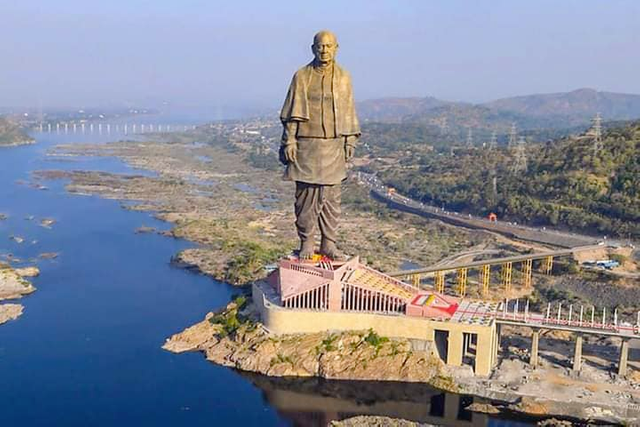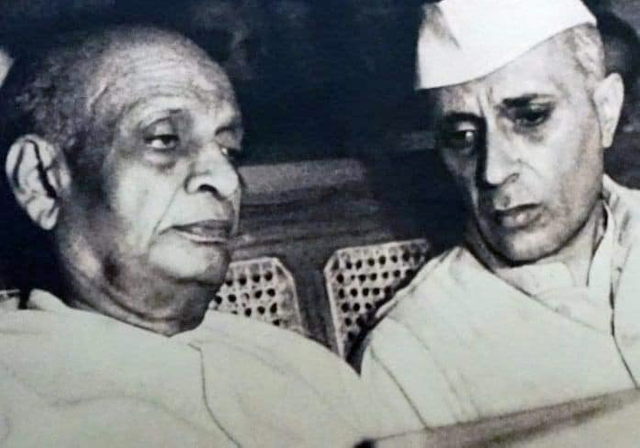Sardar Vallabhbhai Patel
1st Deputy Prime Minister of India
Date of Birth: 31 October 1875
Place of Birth: Nadiad Bombay (now in Gujarat)
Died: 15 December 1950
Place of Death: Bombay
Cause of Death: Heart attack
Political Party: Indian National Congress
Sardar Vallabhbhai Patel is also known as Sardar Patel. He is a great political leader. A freedom fighter who fought against India's independence from the British. A lawyer by profession and political activist, a moderate member of Congress. Mahatma Gandhi's political ideologies strongly influenced Patel.
After India's independence, Patel played a crucial role in the integration of 500 princely states into the Indian Union. He became the first Home Minister and the first Deputy Prime Minister of independent India. His dedication to the development of independent India earned him the title of Iron Man of India.

Early Life Childhood and Education
Sardar Vallabhbhai Patel was born on October 31, 1875 in Nadiad district of Gujarat. His parents were Jawarbai's father who served in the Jhansi Queen's army and Ladbai was his mother. Patel started his schooling in a Gujarati medium school but was transferred to an English medium school. Patel passed his high school. He then went to England in 1910 and obtained a degree in law. In 1913, Patel completed his law degree.
Patel was away from his family for many years so he was able to complete his law degree in two years with intense focus. He returned to Gujarat and started studying law in Godhra district of Gujarat. His fierce speech made him known as an honest and skilled lawyer.
Before moving to England, Patel married Javerbai. The couple had two children, daughter Maniban and son Dayabai. In 1906, Patel contracted an epidemic even while nursing his friend who was suffering from bubonic plague and immediately left Godhra for a hermitage in Nadiad to recover from the epidemic.
Patel strongly rebelled against the British and its laws and refused all lucrative jobs offered to him by the British. In 1909, Patel's wife was diagnosed with cancer and was hospitalized in Mumbai for cancer surgery. However, she could not survive and died in the hospital.
Patel had two young children at the time of her death. He decided not to remarry and with the help of other members of his family, he raised his children to become good human beings. He sent both his children to English medium school in Mumbai.
In 1911, at the age of 36, Patel went to England to study law in London. He returned to India after 30 months to complete his Bar.
Sardar Vallabhbhai Patel moved his family to Ahmedabad and became a successful lawyer. Patel was strongly influenced by Mahatma Gandhi's lectures and soon accepted his doctrine and became a follower of Mahatma Gandhi.
Indian Freedom Movement
He accepted Mahatma Gandhi as their leader. In 1917, he was elected Sanitary Commissioner of Ahmedabad. On Mahatma Gandhi's advice, Patel became the secretary of the Gujarat Assembly, the Gujarat wing of the Indian National Congress. He then addressed a meeting at Borasad and appealed to the people to join the fight against the British for Swaraj.
He became a full-time freedom fighter after quitting his high-profile job. In 1918, he led a massive “tax-free campaign” against the British. Patel asked the farmers not to pay taxes as ordered by the British after the Kaira floods. The peaceful march of peasants and other freedom fighters forced the British to return land to the peasants. This act of bravery by Patel earned him the title of “Sardar”.
Patel opposed the forced labor, known as Begar, that the British practiced against Indians. The relationship with Mahatma Gandhi became closer when both the leaders came together in 1918 at the Kedah Satyagraha. This campaign was for the inhabitants who were unable to pay the heavy taxes due to crop failure and pestilence.
In 1925, farmers in Bardoli Gujarat suffered heavy crop losses due to famine and floods. Due to this, the farmers faced huge financial problems. During this period, the Bombay government had raised taxes by 30%. The peasants could not pay such a huge tax to the British. The movement was led by Sardar Vallabhbhai Patel. He asked the peasants not to submit to British pressure by paying taxes.
The government announced that it would acquire all the lands of the farmers and acquired all the land by force. When the government started auctioning the land, not a single person from everywhere came forward to buy houses. This showed the unity of Indians. The agitation lasted for nearly six months and after several meetings between Patel and the British, the government decided to return the land and houses to the farmers and cancel the revenue payment. Farmers celebrated the victory.
Patel traveled across India to raise funds and promote non-co-operation

#krsuccess #geekpranee #iron #became #srilanka #man #india
Downvoting a post can decrease pending rewards and make it less visible. Common reasons:
Submit
Upvoted! Thank you for supporting witness @jswit.
Downvoting a post can decrease pending rewards and make it less visible. Common reasons:
Submit